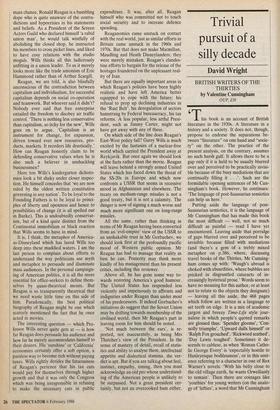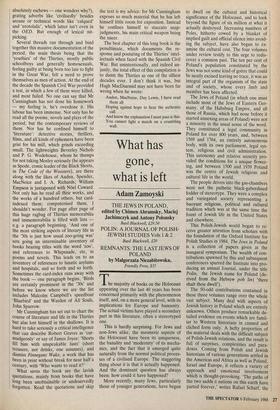Trivial pursuit of a silly decade
David Wright
BRITISH WRITERS OF THE THIRTIES by Valentine Cunningham
OUP, £30
This book is an account of British literature in the 1930s. A literature in a history and a society. It does not, though, propose to endorse the separations be- tween "literature" on one hand and "socie- ty" on the other. The practice of the present analysis, on the contrary, assumes no such harsh gulf. It allows there to be a gap only if it is held to be usually blurred over and perceived to be practically invisi- ble because of the busy mediations that are continually filling it . . .'. Such are the formidable opening sentences of Mr Cun- ningham's book. However, he continues: `The language of post-Saussurian semiotics can help us here.'
Putting aside the language of post- Saussurian semiotics, it is the language of Mr Cunningham that has made this book the most difficult — well, not so much difficult as painful — read I have yet encountered. Leaving aside that porridge of gaps blurred over and perceived to be invisible because filled with mediations (and there's a gem of a trebly mixed metaphor on p.386, where, discussing travel books of the Thirties, Mr Cunning- ham comes up with: Waugh's abroad is choked with absurdities, where bubbles are pricked in disgruntled cataracts of in- creasingly hysterical prose.' Words seem to have no meaning for this author, or at least not to relate to the objects they designate) — leaving all this aside, the 468 pages which follow are written in a language to set teeth on edge. It is a mix of academic jargon and breezy Time-Life style jour- nalese in which people's quoted remarks are glossed thus: 'Spender glooms', 'Con- nolly triumphs', 'Upward dulls himself or `Ralph Fox grouched', `Rickword scathed', `Day Lewis toughed'. Sometimes it de- scends to cablese, as when 'Roman Catho- lic George Every' is 'expectably hostile to Huxleyesque bodilessness', or in this sent- ence referring to a character in one of Rex Warner's novels: 'With his belly close to the old village earth, he wants Orwellianly to remain'. Then there are coinages like `youthies' for young writers (on the analo- gy of 'lefties', a word that Mr Cunningham absolutely eschews — one wonders why?), grating adverbs like `civilisedly' besides arcane or technical words like `calqued' and `erotolalic', which latter isn't even in the OED. But enough of lexical nit- picking.
Several threads run through and bind together this massive documentation of the period, the main thesis being that the `youthies' of the Thirties, mostly public schoolboys and generally homosexuals, feeling guilty at being born too late to fight in the Great War, felt a need to prove themselves as men of action. At the end of the decade the Spanish Civil War provided a test, in which a few of them were killed, and most failed. No one can say that Mr Cunningham has not done his homework — my feeling is, he's overdone it. His labour has been immense. Not only has he read all the poems, novels and plays of the period, but the contemporary reviews of them. Nor has he confined himself to `literature': detective stories, thrillers, films, and all kinds of ephemera have been grist for his mill, which grinds exceeding small. The lightweights Beverley Nichols and P. G. Wodehouse, whom he thumps for not taking Mosley seriously (he appears as Spode, comic leader of the Black Shorts, in The with of the Woosters), are there along with the likes of Auden, Spender, MacNeice and I. A. Richards; William Empson is juxtaposed with Noel Coward. Not only has he read all tlieir works, and the works of a hundred others, but card- indexed them; computerised them, I shouldn't wonder. For page after page of this huge ragbag of Thirties memorabilia and immemorabilia is filled with lists e.g. a paragraph beginning, 'And one of the most striking aspects of literary life in the '30s is just how usual zoo-going was' sets going an interminable inventory of books bearing titles with the word 'zoo', and references to Whipsnade, etc, in poems and novels. This leads on to an inventory of references to lunatic asylums and hospitals, and so forth and so forth. Sometimes the card-index runs away with the book — one paragraph begins, 'Birds are certainly prominent in the '30s' and before we know where we are the list includes Malcolm Campbell's speedboat `Bluebird' and the Warden of All Souls, John Sparrow. Mr Cunningham has set out to chart the course of literature and life in the Thirties but alas lost himself in the shallows. It is hard to take seriously a critical intelligence that can describe Robert Graves as 'cur- mudgeonly' or say of James Joyce: 'Shorts fill him with unspeakable lusts' (short trousers, not drinks, one assumes), and dismiss Finnegans Wake, a work that has been in print without break for near half a century, with 'Who wants to read it?' What saves the book are the lavish quotations, mainly from books that have long been unobtainable or undeservedly forgotten. Read the quotations and skip the text is my advice: for Mr Cunningham exposes so much material that he has left himself little room for exposition. Instead he confines himself to staccato snap- judgments, his main critical weapon being the sneer.
The best chapter of this long book is the penultimate, which documents the re- sponse and posturing of the Thirties' intel- lectuals when faced with the Spanish Civil War. But unintentionally, and indeed un- justly, the total effect of this compilation is to damn the Thirties as one of the silliest decades ever. I don't think it was, but Hugh MacDiarmid may not have been far wrong when he wrote:
Auden, MacNeice, Day Lewis, I have read them all Hoping against hope to hear the authentic call. . . .
And know the explanation I must pass is this: You cannot light a match on a crumbling wall.



















































 Previous page
Previous page